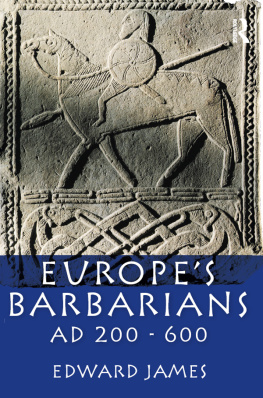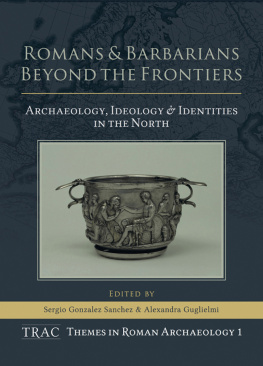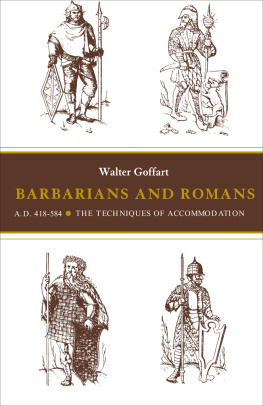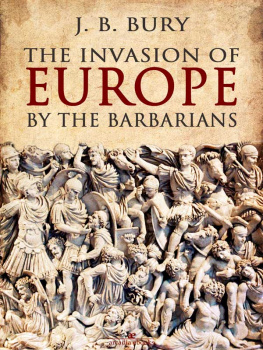EUROPES BARBARIANS,
AD 200600
The Medieval World
Series editor: Julia Smith, The University of Glasgow
Alfred the Great
Richard Abels
The Western Mediterranean Kingdom
David Abulafia
The Fourth Crusade
Michael Angold
The Cathars
Malcolm Barber
The Godwins
Frank Barlow
Philip Augustus
Jim Bradbury
Medieval Canon Law
J. A. Brundage
Crime in Medieval Europe
Trevor Dean
Charles I of Anjou
Jean Dunbabin
The Age of Charles Martel
Paul Fouracre
Margery Kempe
A. E. Goodman
Edward the Black Prince
David Green
Bastard Feudalism
M. Hicks
The Formation of English Common Law
John Hudson
The Mongols and the West
Peter Jackson
Europes Barbarians, AD 200600
Edward James
Cnut
K. Lawson
The Age of Robert Guiscard
Graham Loud
The English Church, 9401154
H. R. Loyn
Justinian
J. Moorhead
Ambrose
John Moorhead
The Devils World
Andrew P. Roach
The Reign of Richard Lionheart
Ralph Turner/Richard Heiser
The Welsh Princes
Roger Turvey
English Noblewomen in the Later Middle Ages
J. Ward
EUROPES
BARBARIANS,
AD 200600
EDWARD JAMES
First published 2009 by Pearson Education Limited
Published 2014 by Routledge
2 Park Square, Milton Park, Abingdon, Oxon OX14 4RN
711 Third Avenue, New York, NY, 10017, USA
Routledge is an imprint of the Taylor & Francis Group, an informa business
Copyright 2009 Taylor & Francis. All rights reserved.
The right of Edward James to be identified as author of this work has been asserted by him in
accordance with the Copyright, Designs and Patents Act 1988.
Notices
Knowledge and best practice in this field are constantly changing. As new research and experience
broaden our understanding, changes in research methods, professional practices, or medical
treatment may become necessary.
Practitioners and researchers must always rely on their own experience and knowledge in evaluating and using any information, methods, compounds, or experiments described herein. In using such information or methods they should be mindful of their own safety and the safety of others, including parties for whom they have a professional responsibility.
To the fullest extent of the law, neither the Publisher nor the authors, contributors, or editors, assume any liability for any injury and/or damage to persons or property as a matter of products liability, negligence or otherwise, or from any use or operation of any methods, products, instructions, or ideas contained in the material herein.
British Library Cataloguing in Publication Data
A CIP catalogue record for this book can be obtained from the British Library
Library of Congress Cataloging in Publication Data
James, Edward, 1947
Europes barbarians, AD 200600 / Edward James. 1st ed.
p. cm.
Includes bibliographical references and index.
ISBN 978-0-582-77296-0 (pbk.)
1. RomeHistoryGermanic Invasions, 3rd-6th centuries. 2. Germanic peoplesRomeHistory.
3. Germanic peoplesEuropeHistory. 4. Roman provincesHistory. 5. EuropeHistoryTo 476.
6. EuropeHistory476-1492. 7. RomeCivilizationForeign influences. 8. EuropeEthnic
relations. 9. RomeEthnic relations. I.Title.
DG312.J365 2009
937.004dc22
2009002079
A CIP catalog record for this book can be obtained from the Library of Congress
ISBN: 978-0-582-77296-0 (pbk)
Set by 35 in 10.5/13pt Galliard
CONTENTS
W hy did the Western Roman Empire end? How and why did medieval Europe begin? These perennially important questions lie at the heart of some of the most vibrant historical scholarship currently being conducted. While some historians have breathed new life into the paradigm of decline and fall, others argue for a complex process of transformation whether gradual or abrupt, peaceful or violent. What no one disputes is that barbarians from outside the boundaries of the Roman Empire played a part. But what part? Who were they anyway? How many were there? What were they like? In this book, Edward James guides the reader through these debates with a sure interpretive touch and an authoritative grasp of all the evidence.
He tells this story with a difference. Its central characters are never the Romans but always the barbarians. His theme is what the barbarians contributed to European history, and his geographical scope extends from Ireland and Scandinavia to the Mediterranean and the Danube basin. On this broad canvas, he takes account of a large number of different peoples, not only those who remain household names such as the Goths, Franks, Saxons or Picts, but also such half-forgotten groups as the Heruls, or Sarmatians and he even mentions the Ohtgaga and Noxgaga, whose names only occurs once in the historical record.
James explains how new kingdoms emerged on Roman soil, taking their identity from barbarian armies and their leaders. His account balances narrative (Chapters 24) with analytic overviews (Chapters 512) of issues central to current debates: the changing character of late Roman provincial societies; the nature of early medieval ethnic identities; the multiple interactions of Romans and barbarians besides warfare; the problem of how many people may have migrated, and how far. The nature of barbarian kingship and governance, and the role of religion in political change and cultural identity also receive full attention. He closes by demonstrating that the barbarians contribution to Europes political mythologies remains potent.
A key feature of this book as of Edward Jamess earlier work is his skill in juxtaposing archaeological evidence with the historical record. By balancing material culture with the written word, he brings nuance and fair-mindedness to key controversies. He is also alive to the importance of complementary disciplines such as the history of language and of place-names, and introduces readers to the newest research methods, notably genetic anthropology.
All those interested in the early Middle Ages will find James an enlightening and often witty guide to the rich and fascinating story of Europes barbarians.
Julia M.H. Smith
We are grateful to the following for permission to reproduce copyright material:
Maps
Map 1 adapted from The Decline of the Ancient World, Longman (Jones, A.H.M. 1966) 100101; Map 2 after Tacitus: Germania, by permission of Oxford University Press (Rives, J.R. 1999) xiixiii; Map 3 from Borders, Barriers and Ethnogenesis: Frontiers in Late Antiquity and the Middle Ages, Brepols (Curta, F. 2005) 156; Map 5 after The Making of the Slavs, Cambridge University Press (Curta, F. 2001) 198; Map 7 from
Next page












